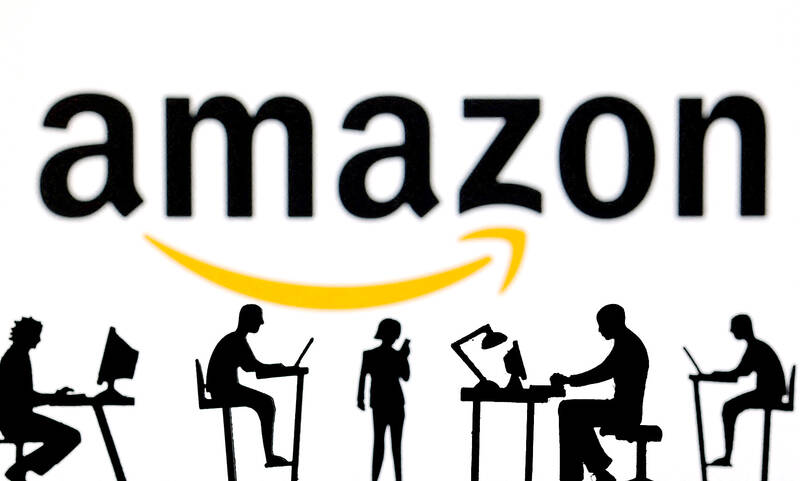Amazon.com Inc plans to spend S$12 billion (US$8.86 billion) over the next four years to expand its cloud computing infrastructure in Singapore, Amazon Web Services (AWS) said yesterday.
The investment adds to the S$11.5 billion the company has already invested in the Asia-Pacific region until last year, bringing its total planned spending to more than S$23 billion by 2028, AWS said in a statement.
Southeast Asia’s top leaders are scrambling for a bigger slice of the global tech pie, with Malaysia, Vietnam and Singapore hosting Nvidia Corp CEO Jensen Huang (黃仁勳) in December last year, and Apple Inc CEO Tim Cook visiting Singapore, Vietnam and Indonesia last month.

Photo: Reuters
Recent investments in the region include Apple’s plan to invest more than US$250 million into its operations in Singapore.
AWS also announced a collaboration with the Singaporean government, public sector organizations and enterprises to help accelerate the adoption of artificial intelligence (AI) and generative AI in Singapore, the statement said.
“AWS is doubling down on its cloud infrastructure investments in Singapore from 2024 to 2028 to support customer demand, and help reinforce Singapore’s status as an attractive regional innovation launchpad,” AWS country manager Priscilla Chong said.
The announcement at the AWS ASEAN Summit in Singapore marks Amazon’s latest move in its plan to build AWS infrastructure across Southeast Asia. The company had previously announced a US$5 billion investment in Thailand and a US$6 billion spend in Malaysia.
Amazon’s announcement comes days after Microsoft Corp CEO Satya Nadella announced cloud services investments worth US$2.2 billion in Malaysia and US$1.7 billion in Indonesia during a visit to the region.
With a young tech-savvy population of 670 million, Southeast Asia has seen increasing interest from technology giants.
Reuters reported in December last year that Malaysian conglomerate YTL Corp Bhd’s utilities unit would partner with Nvidia to develop AI infrastructure in a US$4.3 billion investment deal.
On Monday, Malaysian Minister of Investment, Trade and Industry Tengku Zafrul Aziz said that Google was also planning to invest in the country with an announcement expected “in the near future,” a report by state news agency Bernama said.
Meanwhile, Indonesia is keen to have Huang visit again, with Indonesian Minister of Communication and Informatics Budi Arie Setiadi saying last month that they had invited him.

When an apartment comes up for rent in Germany’s big cities, hundreds of prospective tenants often queue down the street to view it, but the acute shortage of affordable housing is getting scant attention ahead of today’s snap general election. “Housing is one of the main problems for people, but nobody talks about it, nobody takes it seriously,” said Andreas Ibel, president of Build Europe, an association representing housing developers. Migration and the sluggish economy top the list of voters’ concerns, but analysts say housing policy fails to break through as returns on investment take time to register, making the

‘SILVER LINING’: Although the news caused TSMC to fall on the local market, an analyst said that as tariffs are not set to go into effect until April, there is still time for negotiations US President Donald Trump on Tuesday said that he would likely impose tariffs on semiconductor, automobile and pharmaceutical imports of about 25 percent, with an announcement coming as soon as April 2 in a move that would represent a dramatic widening of the US leader’s trade war. “I probably will tell you that on April 2, but it’ll be in the neighborhood of 25 percent,” Trump told reporters at his Mar-a-Lago club when asked about his plan for auto tariffs. Asked about similar levies on pharmaceutical drugs and semiconductors, the president said that “it’ll be 25 percent and higher, and it’ll

NOT TO WORRY: Some people are concerned funds might continue moving out of the country, but the central bank said financial account outflows are not unusual in Taiwan Taiwan’s outbound investments hit a new high last year due to investments made by contract chipmaker Taiwan Semiconductor Manufacturing Co (TSMC, 台積電) and other major manufacturers to boost global expansion, the central bank said on Thursday. The net increase in outbound investments last year reached a record US$21.05 billion, while the net increase in outbound investments by Taiwanese residents reached a record US$31.98 billion, central bank data showed. Chen Fei-wen (陳斐紋), deputy director of the central bank’s Department of Economic Research, said the increase was largely due to TSMC’s efforts to expand production in the US and Japan. Investments by Vanguard International

WARNING SHOT: The US president has threatened to impose 25 percent tariffs on all imported vehicles, and similar or higher duties on pharmaceuticals and semiconductors US President Donald Trump on Wednesday suggested that a trade deal with China was “possible” — a key target in the US leader’s tariffs policy. The US in 2020 had already agreed to “a great trade deal with China” and a new deal was “possible,” Trump said. Trump said he expected Chinese President Xi Jinping (習近平) to visit the US, without giving a timeline for his trip. Trump also said that he was talking to China about TikTok, as the US seeks to broker a sale of the popular app owned by Chinese firm ByteDance Ltd (字節跳動). Trump last week said that he had